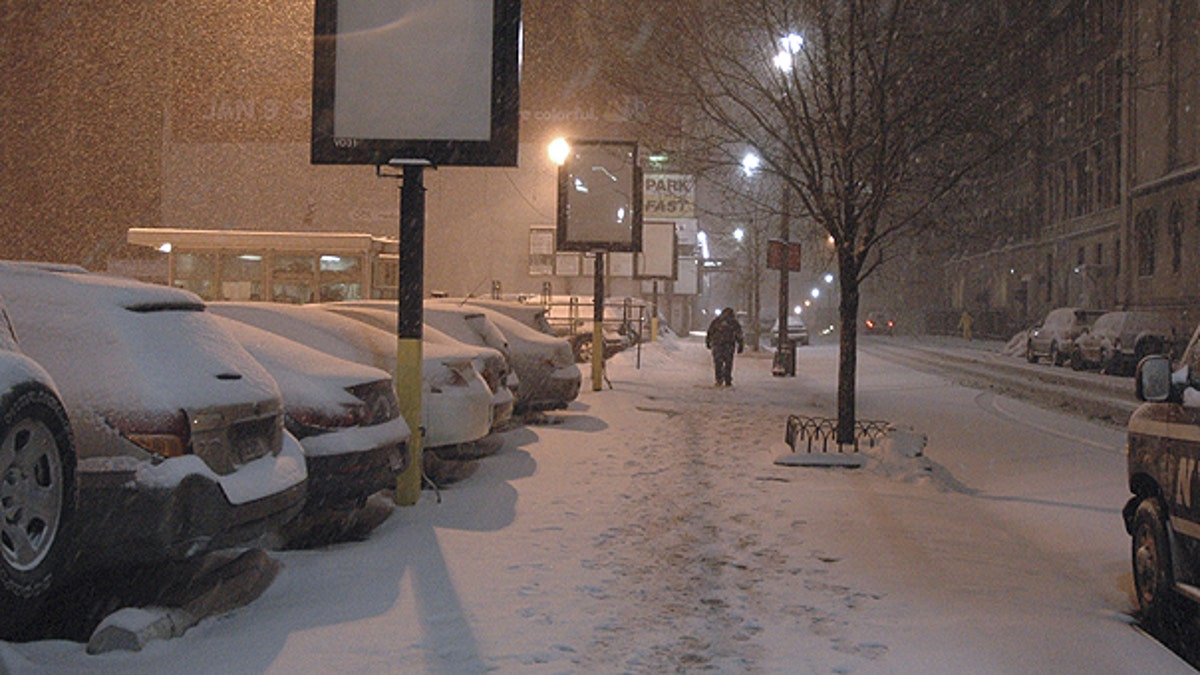
Jan. 12: A man trudges down a snow-covered sidewalk in New York. (AP)
Remember when President Obama ordered his Cabinet to come up with $100 million in spending cuts last year?
Sadly, the snowstorm blasting the nation's capital wiped out those savings in a day.
While D.C. residents take out their snow shovels for untold hours of back-breaking labor, the Office of Personnel Management estimates that the shuttering of the federal government is breaking the bank as well -- costing taxpayers about $100 million every day in lost productivity, or work that's not getting done.
With Friday's half day, and three full days of government shut-down this week, that adds up to $350 million -- and it could top $500 million if the government, with its 230,000 D.C.-area employees, remains closed through the end of the week.
Trillion-dollar deficits, health care packages and stimulus bills may have numbed the public a bit to the value of $1 million, or $100 million. So FoxNews.com took a look at what $100 million can get the federal government these days, and here's what turned up:
-- 1,404 annual federal salaries. A recent estimate pegged the average federal pay at just over $71,000. With $100 million, the administration could fund 1,404 of those every day.
-- Nearly a full year's worth of foreclosure prevention funding. The president's fiscal 2011 budget calls for $113 million in foreclosure prevention "activities," which covers counseling for about 40,000 homeowners every month. Five and a half days of closings would help nearly 200,000 homeowners every month.
-- 18,692 Pell Grants. Washington increased the maximum Pell Grant award by $600 last year, putting the total value at $5,350.
-- 667 full-body scanners for U.S. airports, more than the double the number the Transportation Security Administration plans to buy this year. Calls for the installation of the scanners increased after the failed bombing of a Detroit-bound flight on Christmas. The TSA, as of late December, had only 40 in operation, with plans to deploy 150 this year and buy another 300 at the same time -- at a cost of between $130,000 and $170,000 apiece.
-- More than 300 new customs officers for screening at U.S. ports. The fiscal 2011 budget includes $94 million for that many new officers, hired to screen passengers and cargo at "ports of entry." The money is also going toward improving screening on the front end, at foreign airports and elsewhere. Five and a half days of shutdown could save or create 1,755 customs jobs.
-- The total cost, and then some, for next year's handling of the Guantanamo Bay detainees. The Department of Justice's fiscal 2011 budget request includes $73 million for the "transfer, prosecution and incarceration" of Guantanamo prisoners.
-- 93,949 monthly Social Security payments. With Social Security going broke, recipients might want to get their payments while they can. The government estimates the average monthly check is $1,064.
-- One full Haiti aid package. Obama's initial pledge of U.S. aid for earthquake-stricken Haiti was exactly $100 million.
-- 40 Super Bowl ads from the U.S. Census Bureau. The bureau angered some lawmakers after it was revealed its Super Bowl ad promoting the 2010 Census cost $2.5 million. But why stop there?
-- Full funding for the Bureau of Economic Analysis. The bureau, which has its work cut out for it as the economy appears to stagger toward some kind of recovery, is funded for $109 million in the president's 2011 budget plan.
And the list goes on. The federal government is not completely shuttered. The Office of Personnel Management is granting an "excused absence" to all non-emergency employees, but "emergency employees" are being told to come in and some are expected to telecommute.
This week's shutdown is the longest period of time the federal government has been closed in more than a decade. The longest in history occurred for about three weeks from December 1995 to January 1996 over a debt limit dispute. In that case, hundreds of thousands of federal employees were furloughed, meaning they were not paid.
That's not the case this time. But OPM Director John Berry wrote in a memo last week to human resources directors that the decision to close was being made "out of concern for employee safety and to help alleviate traffic concerns."




